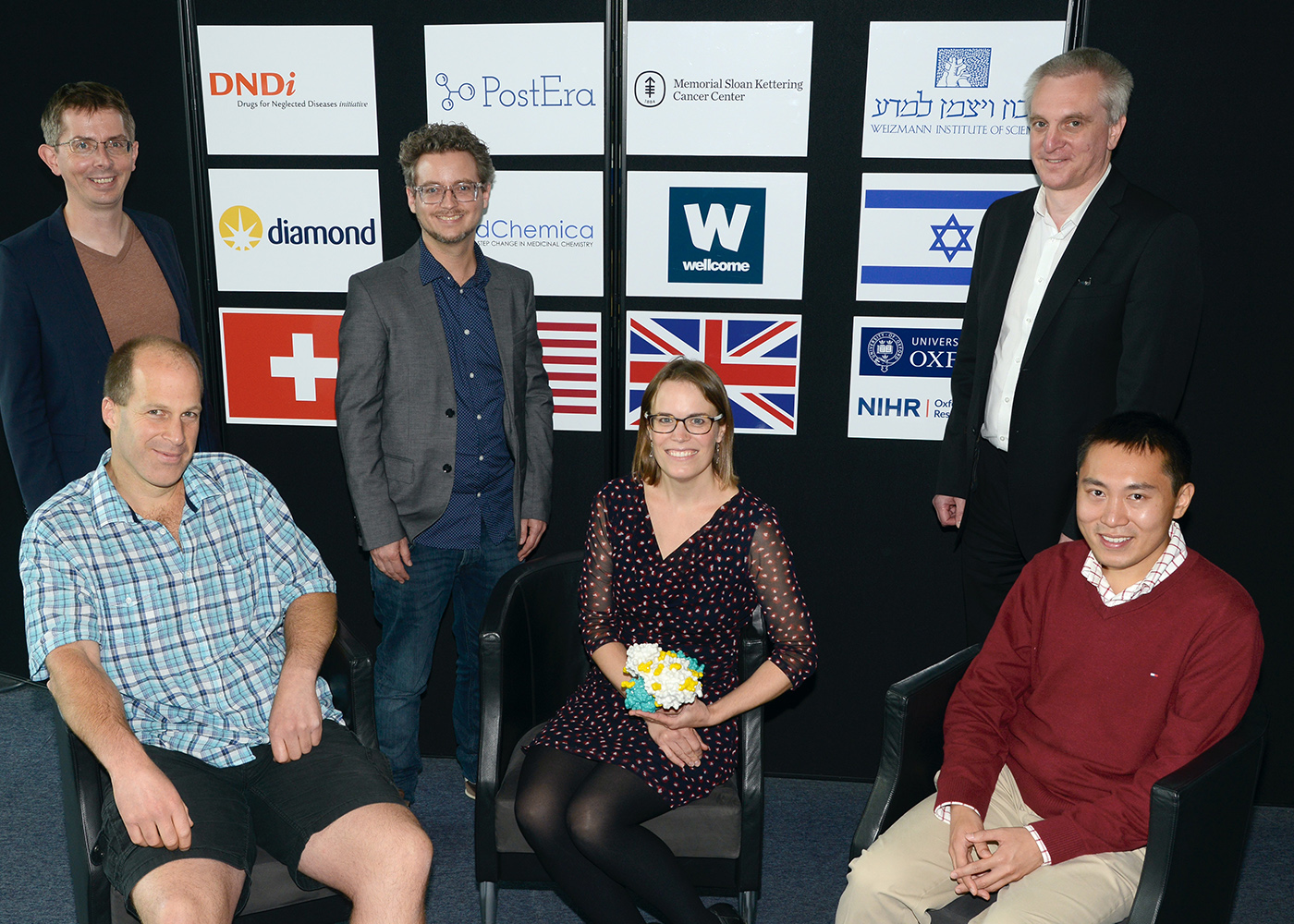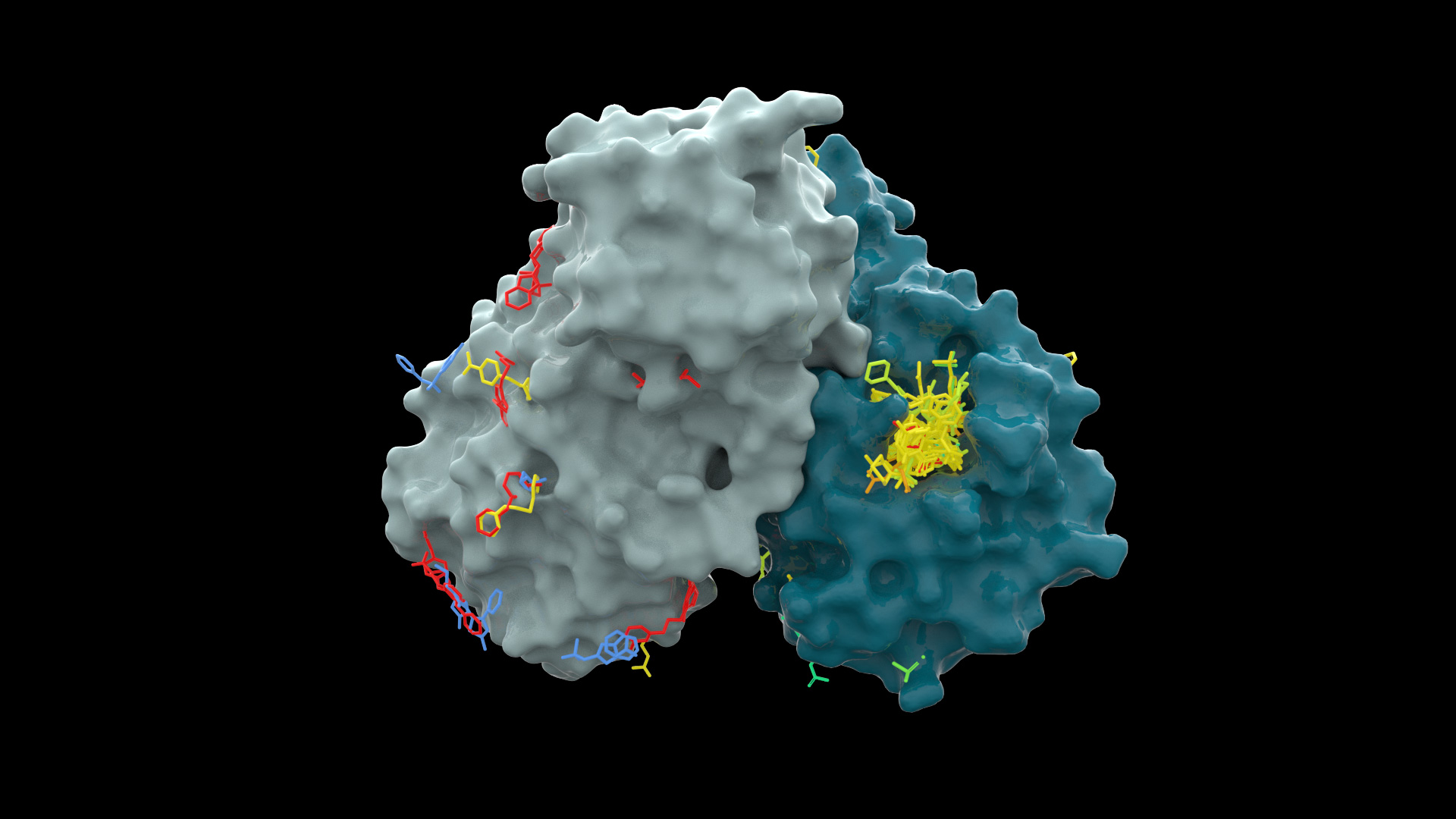Find out more about our ambitious upgrade project, delivering more brightness, more coherence, and greater speed of analysis to UK science. More about Diamond-II
![]()
Find out more about Diamond's response to virus research.
![]()
Find out about upcoming events and webinars, and watch past events.
You can also explore Diamond by using our interactive map and discover the synchrotron, beamlines and much more.

The COVID Moonshot consortium, of which Diamond is a member, has received key funding of £8 million from Wellcome, on behalf of the COVID-19 Therapeutics Accelerator. The funding will help contribute to developing a safe, globally accessible and affordable antiviral medication.
The COVID Moonshot is a non-profit, open-science consortium, formed in 2020. As countries locked down, a group of scientists, academics, pharmaceutical research teams and students began a worldwide race against the clock to identify new drug molecules that could block the SARS-CoV-2 infection and develop an antiviral drug that would be globally affordable and easily-manufactured. Diamond is a collaborator of this project, which includes academic and industrial groups from around the world.
Thanks to this unprecedented collaboration, rapid progress has been made and the team now aims to identify pre-clinical candidate drug molecules by end of 2021 – compounds that will be simple to manufacture in the form of tablets and which will exert an anti-viral effect via potent inhibition of the main protease (MPro) of the SARS-CoV-2 virus. The project now enters the more capital-intensive phase - tweaking, optimising and testing these drug molecules to develop them into a safe treatment. The financial support from Wellcome will be key in this process.
Diamond contributes to the COVID Moonshot research predominately through its XChem fragment screening platform.
Following the successful crystallisation of the Main Protease (MPro) at Diamond, the crystals were brought on to the XChem platform where scientists were able to screen all the available fragment libraries at Diamond. This was achieved by a collaboration of scientists from across Diamond’s XChem facility and the I04-1 beamline, who focused entirely on crystal soaking and mounting, and the subsequent data collection.
The focus then switched to a mass effort in data analysis, checking the structures and building the relevant ligands into the electron density. All the structures of MPro with bound fragments were then released immediately into the Protein Data Bank (PDB), and published on the Diamond website - a total of 91 bound fragments were identified from the initial screens.
Releasing information in this manner allowed scientists from all over the world to use the data and start extrapolating and designing follow up compounds to act as inhibitors for the virus.
Frank von Delft, Principal Beamline Scientist at Diamond and Professor of Structural Chemical Biology at the University of Oxford, commented on this project in Nature. He said:
Open drug discovery efforts are invariably super slow – ours has been an express train on tracks we have had to lay down as we go. It is a way of working none of us realised was possible.
The COVID Moonshot project is one of 60 projects that has, so far, been undertaken at Diamond to help fight COVID-19.

More than 150 scientists - including dozens of students who put their own projects on hold – joined Moonshot to Crowdsource ideas for molecular compounds, model them and evaluate them in-vitro against the virus.
In addition to Diamond, collaborators of the Moonshot project include, the Weizmann Institute of Science (Israel); the Nuffield Department of Medicine at the University of Oxford (UK); PostEra (US/UK); the Memorial Sloan Kettering Cancer Center (US); various drug discovery consultants including MedChemica Ltd (UK), Thames Pharma Partners (US), and Compass Business Partners (UK); and the Drugs for Neglected Diseases initiative (Switzerland), which is now taking the lead in coordinating the Wellcome-funded drive towards the clinic.
Alpha Lee, Chief Scientific Officer at PostEra and Faculty Member at the University of Cambridge, explained how this new funding will be critical in developing novel antiviral therapeutics. He said:
Most of the research and funding efforts early in the pandemic focused predominantly on repurposing of existing small molecule drugs and the more rapid development of novel monoclonal antibodies. Now, with the realization that COVID-19 will be a global issue for the foreseeable future we urgently need to develop novel antiviral therapeutics. We are therefore thrilled to receive this critical funding from Wellcome and hope it can lead to more support.
All the generated discovery scientific data and the general learnings of the project will be put in the public domain. Moonshot data is already available online to enable others to freely build on its work – the project has already generated over 50 percent of known structural information on the main protease, a key protein in SARS-CoV-2. The first clinical trials are expected in 2022.
Nir London, Senior Scientist at the Weizmann Institute of Science, added:
If drug discovery efforts that were launched during the 2003 SARS epidemic had persevered and had been funded to completion, relevant anti-coronavirus drugs would have been more readily available when COVID-19 hit. Now is the time to plan for the future. In addition to addressing this current pandemic, which is not showing signs of slowing, we want to develop one or more novel pan-coronavirus antiviral molecule for future outbreaks. We also want to provide an open platform to accelerate the response time when new pandemics arise.
Diamond Light Source is the UK's national synchrotron science facility, located at the Harwell Science and Innovation Campus in Oxfordshire.
Copyright © 2022 Diamond Light Source
Diamond Light Source Ltd
Diamond House
Harwell Science & Innovation Campus
Didcot
Oxfordshire
OX11 0DE
Diamond Light Source® and the Diamond logo are registered trademarks of Diamond Light Source Ltd
Registered in England and Wales at Diamond House, Harwell Science and Innovation Campus, Didcot, Oxfordshire, OX11 0DE, United Kingdom. Company number: 4375679. VAT number: 287 461 957. Economic Operators Registration and Identification (EORI) number: GB287461957003.